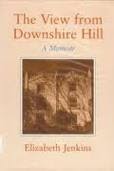 Elizabeth Jenkins was born on October 31, 1905, Hitchin, Hertfordshire, and died ast the age of 104 last September. She studied at Newham College, Cambridge, beginning in 1924. Through the head of her college, Pernel Strachey (Lytton Strachey’s sister), Jenkins met Virginia Woolf. After Cambridge, Jenkins settled in Bloomsbury, London, and worked on her first novel. She was invited to visit Mrs. Woolf and her huband, Leonard, a visit repeated many times.
Elizabeth Jenkins was born on October 31, 1905, Hitchin, Hertfordshire, and died ast the age of 104 last September. She studied at Newham College, Cambridge, beginning in 1924. Through the head of her college, Pernel Strachey (Lytton Strachey’s sister), Jenkins met Virginia Woolf. After Cambridge, Jenkins settled in Bloomsbury, London, and worked on her first novel. She was invited to visit Mrs. Woolf and her huband, Leonard, a visit repeated many times.
Jenkins found Virginia as fascinating as we imagine she must have been. To quote the Telegraph’s obituary, published 6 September, 2010, Jenkins “found the famous writer ‘very beautiful’ and the ‘ineffably distinguished’ company ‘enough to take one’s breath away’. But after a few months she found herself frozen out of conversation, or addressed in ‘contemptuous and mocking’ tones. Scorned, she did not seek to meet Woolf again, even after the Bloomsbury figurehead subsequently inquired after her and described Virginia Water (1928) as ‘a sweet white grape of a book’.
Jenkins’ first novel was published by the first publisher she contacted, the famous Victor Gollancz who himself was a leading literary figure in the London of pre- and post World War II. Of course this is the kind of situation, the lack of any rejection, that stirs some of us to great envy. But even with considerable literary success, Elizabeth Jenkins had many boring and unfulfilling jobs in dull offices. Nevertheless she never stopped writing. And publishing. Gollancz (1893-1967) also published Ford Madox Ford and George Orwell, among others. He was knighted in 1965.
In addition to novels, Jenkins wrote many biographies, the first being of Lady Caroline Lamb, a wild young woman whose shocking behavior with Lord Byron and whose society connections in regency England made her a perfect subject for a life story. Jenkins followed this work with a still-admired biography of Jane Austen in 1938. Two years later, she was a co-founder of the Jane Austen Society, as mentioned above. Today, the rescued cottage is known as Jane Austen’s House Museum and has an excellent website.
Probably the most admired novel by Jenkins is The Tortoise and the Hare. The Telegraph wrote, “…tales of human intrigue were to recur throughout Elizabeth Jenkins’s fiction, notably in her best-known novel, The Tortoise and the Hare (1954), about the gradual collapse of an apparently perfect marriage. The title refers to the two women competing for the affections of a wealthy barrister, Evelyn. His beautiful wife, Imogen, seems to have little to fear from a stout, capable neighbour, Blanche. But as her own insecurities overwhelm her, Imogen can only watch as Blanche’s dull charms win the day. Like her other works, The Tortoise and the Hare relied on Elizabeth Jenkins’s subtle portrayal of complex human relationships. By the end of the book, the author makes it clear that though Imogen is suffering, she has collaborated fully in own her pain. “
Another great author and friend of Jenkins was Elizabeth Bowen, whose novels and short stories are admired. I have to admit I have not read many of them, but I have alsways wanted to add them to my TBR pile, along with Elizabeth Jenkins’ novels and nonfiction.
Though I am eager to read more of Elizabeth Jenkins’ life, we are fortunate indeed to have this fine book, The View from Downshire House, random recollections which really whet our appetites. In fact, I can quote Jane Austen’s Emma: “It was a delightful visit – perfect, in being much too short.”






